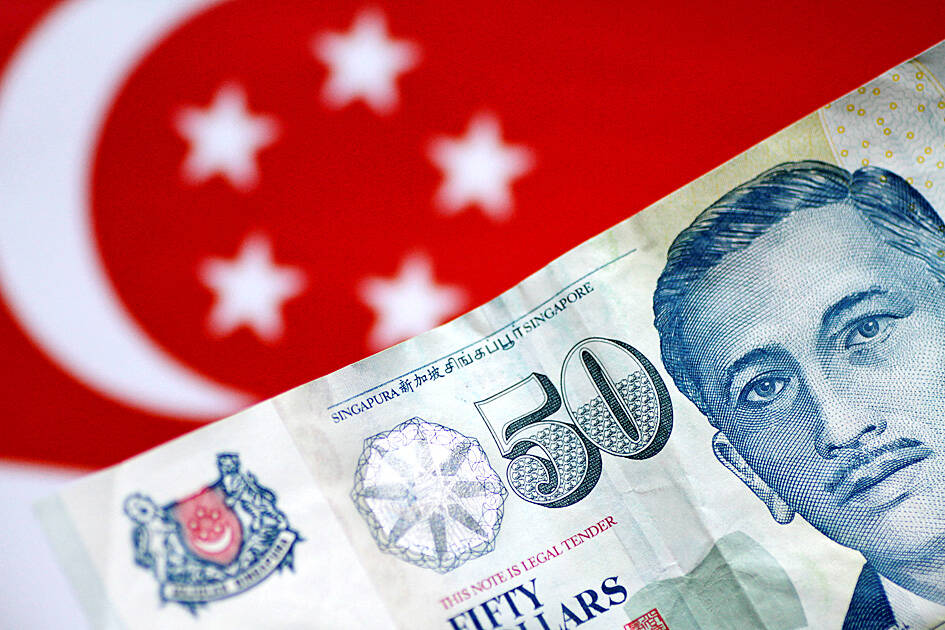The Singapore dollar this year has established itself as Asia’s most resilient currency against the US dollar, and some strategists are betting on more strength if price pressures force the nation’s central bank to tighten its exchange-rate policy again next month.
Goldman Sachs Group Inc, Citigroup Inc and MUFG Bank Ltd are among banks that are bullish on the currency, underpinned by an expectation that the Monetary Authority of Singapore (MAS) could extend policy tightening at its October meeting to help rein in core inflation, which hit a 14-year high in July.
The predictions come as almost every major currency retreats against the dollar, with the US Federal Reserve set on an aggressive rate-hike cycle. While the MAS has turned the nation’s currency into a winner against peers in Asia, it is still down more than 4 percent against the US dollar this year.

Photo: Reuters
MUFG Bank puts the likelihood of additional tightening by the MAS next month at 50 percent, which could translate into a gain of more than 1 percent for the local currency versus the US dollar over the following months, according to Jeff Ng, a currency strategist at MUFG Bank in Singapore.
“Our call of a Singapore dollar rebound is premised on most of the Fed’s eventual rate hikes already being priced into markets now,” he said.
MUFG forecasts the Asian currency rising to S$1.38 against the US dollar by the end of this year. It closed last week at S$1.407.
Unlike most central banks that use interest rates to guide policy, the MAS responds to rising core inflation by guiding the local dollar higher against a basket made up of the currencies of its major trading partners. The central bank focuses on the level of the Singapore dollar’s nominal effective exchange rate, which it allows to move within a policy band.
Still, even if the MAS does extend its policy tightening for a fourth time this year, there is no guarantee that the local currency would rally against the US dollar. The Singapore dollar earlier this month slumped to its lowest level in more than two years, before paring this year’s decline to 4.1 percent by the end of last week.
“Despite the MAS tightening, USD/SGD has continued to inch higher amidst a broad USD rally supported by a hawkish Fed, geopolitical tensions and a slowdown in China’s growth,” Divya Devesh, head of ASEAN and South-Asia FX research at Standard Chartered Bank SG Ltd in Singapore, wrote in a note yesterday.

Taiwan Semiconductor Manufacturing Co (TSMC, 台積電) yesterday said that its investment plan in Arizona is going according to schedule, following a local media report claiming that the company is planning to break ground on its third wafer fab in the US in June. In a statement, TSMC said it does not comment on market speculation, but that its investments in Arizona are proceeding well. TSMC is investing more than US$65 billion in Arizona to build three advanced wafer fabs. The first one has started production using the 4-nanometer (nm) process, while the second one would start mass production using the

A TAIWAN DEAL: TSMC is in early talks to fully operate Intel’s US semiconductor factories in a deal first raised by Trump officials, but Intel’s interest is uncertain Broadcom Inc has had informal talks with its advisers about making a bid for Intel Corp’s chip-design and marketing business, the Wall Street Journal reported, citing people familiar with the matter. Nothing has been submitted to Intel and Broadcom could decide not to pursue a deal, according to the Journal. Bloomberg News earlier reported that Taiwan Semiconductor Manufacturing Co (TSMC, 台積電) is in early talks for a controlling stake in Intel’s factories at the request of officials at US President Donald Trump’s administration, as the president looks to boost US manufacturing and maintain the country’s leadership in critical technologies. Trump officials raised the

‘SILVER LINING’: Although the news caused TSMC to fall on the local market, an analyst said that as tariffs are not set to go into effect until April, there is still time for negotiations US President Donald Trump on Tuesday said that he would likely impose tariffs on semiconductor, automobile and pharmaceutical imports of about 25 percent, with an announcement coming as soon as April 2 in a move that would represent a dramatic widening of the US leader’s trade war. “I probably will tell you that on April 2, but it’ll be in the neighborhood of 25 percent,” Trump told reporters at his Mar-a-Lago club when asked about his plan for auto tariffs. Asked about similar levies on pharmaceutical drugs and semiconductors, the president said that “it’ll be 25 percent and higher, and it’ll

CHIP BOOM: Revenue for the semiconductor industry is set to reach US$1 trillion by 2032, opening up opportunities for the chip pacakging and testing company, it said ASE Technology Holding Co (日月光投控), the world’s largest provider of outsourced semiconductor assembly and test (OSAT) services, yesterday launched a new advanced manufacturing facility in Penang, Malaysia, aiming to meet growing demand for emerging technologies such as generative artificial intelligence (AI) applications. The US$300 million facility is a critical step in expanding ASE’s global footprint, offering an alternative for customers from the US, Europe, Japan, South Korea and China to assemble and test chips outside of Taiwan amid efforts to diversify supply chains. The plant, the company’s fifth in Malaysia, is part of a strategic expansion plan that would more than triple